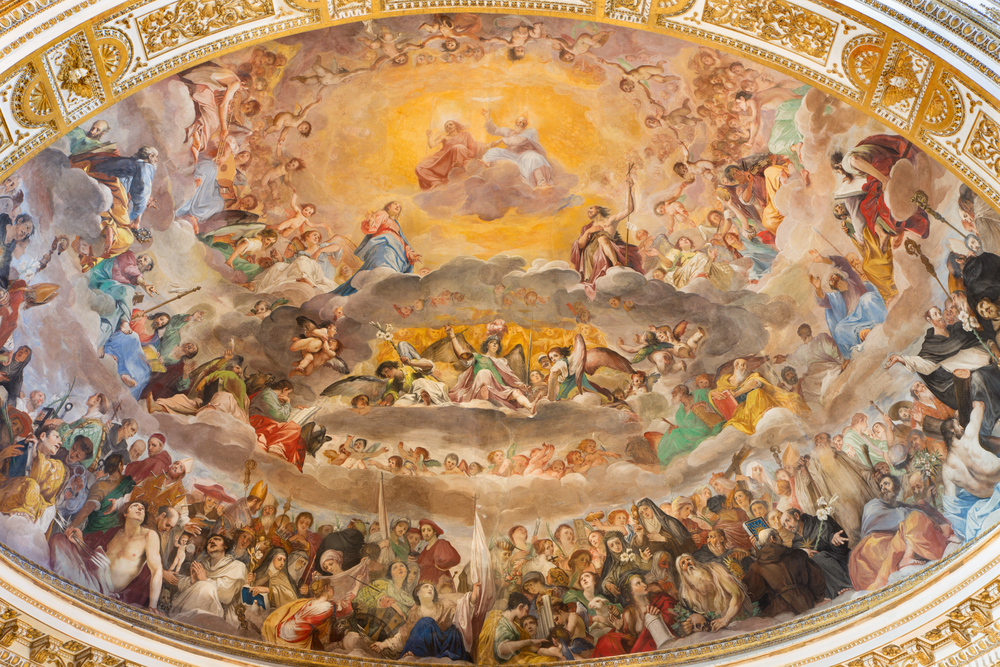When we think of heaven, memory calls up vivid and strange images from movies, comic strips, greeting cards, and fine art. Almost one-and-a-half centuries ago, Huckleberry Finn imagined it as a place where spirits “go around all day long with a harp and sing, forever and ever.”
It is every Christian’s ultimate goal, and yet it is commonly misunderstood.
James L. Papandrea has written a short, often funny, engaging book to set the record straight: “What Really Happens After We Die (There Will Be Hugs in Heaven)” (Sophia Institute Press, $11). An eminent scholar of early Christianity, Papandrea has also written novels and popular religion books like “Trinity 101.” He spoke with Angelus about the common hope of Christians.
What is the truth about heaven that people find most surprising?
People are conditioned to believe that it is your soul, or your spirit, that “goes to heaven,” and they don’t think much about the redemption of the body. We say we believe in the resurrection of the body in the Apostles’ Creed, but a lot of people who aren’t faithful Catholics never actually say the Apostles’ Creed.
People who never say the rosary, even if they go to Mass, can rationalize the phrase “resurrection of the dead” in the Nicene Creed as though it is just a vague reference to eternal life.
We know that it means the resurrection of the body, but people who don’t give it much thought might be surprised to realize that, yeah, we really believe in the actual resurrection of the body. So the kingdom of heaven is not some ethereal, disembodied existence. It is an embodied existence, in which the body will be (like it is now) the interface between the mind and creation.
What are the most common misconceptions people have about heaven?
Based on what people accept from the movies, it would seem that heaven is supposed to be a very sparsely decorated kind of “anti-space,” where existence is primarily mental.
When people die, they first become ghosts, and then when they follow the light and get to heaven they become angels. And of course, every time a bell rings, an angel gets his wings.
Having said that, the 1998 film, “What Dreams May Come,” was visually stunning.
I wouldn’t say it teaches perfect theology, but in the depiction of heaven it was very creative. Rather than going minimalistic with heaven, it went the other way: Heaven was depicted not as a place that lacked creation, but as a place of hypercreation. It was like earth, but more “alive,” and more colorful.
So I think the people who made that film got at least one thing right — heaven is not outside of creation, it is the ultimate creation — or to put it in Christian terms, it is redeemed and renewed creation.
What exactly is heaven? And how do we know what we know about it?
What we know about heaven comes primarily from the Scriptures, and especially from what Jesus taught in the Gospels and revealed to John as recorded in the Book of Revelation.
I think we have to keep in mind that the word “heaven” is rarely, if ever, in the singular in the Scriptures. It’s really, “the heavens,” which is metaphorical language, like saying God is “up there looking down on us,” when in fact we know that God is everywhere around us.
Somehow the word “heaven” became a kind of catch-all term for the afterlife, at least for those who assume they are not going to hell.
When we use the word, we are really talking about a reality that has two phases to it. There is pre-resurrection heaven and post-resurrection heaven. Pre-resurrection heaven is what we call paradise.
It’s the existence of a blessed afterlife (most likely after the purification of purgatory), but paradise exists during the time that human history continues in the world as we know it. So right now the spirits of many people are in paradise, but their bodies (or the molecules that used to be their bodies) are still on earth.
At some point, human history ends, Jesus Christ initiates his “second coming,” and there is judgment, and the resurrection of the dead. That is, all bodies will be resurrected, reunited with their spirits, and those who are being saved enter into the fully revealed kingdom of God, which is the New Heaven/New Earth, and the “New Jerusalem” of the Book of Revelation. So “heaven” really includes both paradise and the kingdom of God, but only in the latter will we have bodies, so we have to wait for the kingdom to be fully revealed before there will be hugs in heaven.

What is the truth about heaven you find most troubling?
Well, I don’t like the idea that there might not be pizza and pasta in heaven. Jesus said we won’t need to eat, but I’m holding out hope that it will be optional.
Does the language we use for heaven leave us vulnerable to anti-Christian ridicule?
You’d think it would, but I would argue that people who are not Christian, or who are nominally Christian, are actually more susceptible to accusations of gullibility than we are.
Think about all the popular speculation out there that personifies the universe rather than believes in an intelligent Creator, or ascribes all kinds of comforting activities to angels without any basis in Scripture or Tradition, or ascribes power over the future to the movements of the planets.
The truth is, the ones who most ridicule our traditional view of heaven are self-described progressive Christians who think they are too rational to believe in much that is supernatural, but who reduce the Christian faith to a worldly focused social program.
Like Judas, in response to the woman who anointed Jesus, they take the focus off the person of Christ (on the rationale that such devotion is too “pie-in-the-sky”) and emphasize the social gospel disproportionately over the gospel of salvation.
Or worse, they assume a universalist afterlife and reduce the concept of salvation to confronting injustice. So ironically, sometimes the ridicule comes more from within the Church.
Where did you get the question about hugs in your subtitle?
Actually that was my original title. I pitched the book to the publisher simply as “There WILL Be Hugs in Heaven,” but the good (and smart) folks at Sophia Institute Press knew that the title needed more to it.
The point is that the concept of hugs in heaven was there from the beginning, because I really wanted to give people the hope that heaven is ultimately a reunion, and when you combine that with our understanding of the resurrection of the body, well, then of course there will be hugs in heaven!
My favorite chapter in your book is titled “Yoga, Yoda, and YOLO.” What on earth are you doing there?
Although this book is about the afterlife, it’s also about what we believe a human being really is.
A lot of eastern philosophy (yoga), popular culture (Yoda), and other religious traditions (reincarnation) are built on the assumption that the human person is really just a mind temporarily living in a body. And if that’s true, then the essence of who I am could theoretically switch bodies, or discard the body altogether without really losing anything.
But that way of looking at the human person is opposed to what Jesus and the whole Judeo-Christian tradition teaches. The Christian faith affirms that our bodies are an essential part of who we are, and so even if you could put my mind into another body (or upload it into a computer), that would no longer be me.
In the same way, we affirm the resurrection of the body because if our bodies are not raised, then we are not redeemed whole. If only our mind (or soul, or spirit) are saved, then only part of us is saved.
How should our awareness of heaven influence our lives from day to day? Year to year? Season of life to season of life?
I really believe that our bodies are one of God’s greatest gifts to us. We as a culture need to reaffirm the dignity of the body as a sacred gift. It is not to be reduced to an instrument of pleasure; nor is it to be used to exploit others or the rest of creation.
I think it would be great if parishes could find a way to include the care of our bodies into spiritual formation. The fact that our bodies are integrated into worship is a great start. That is, we do not worship God with our minds only, but we worship with our whole bodies: standing, sitting, kneeling, walking, seeing, singing, hearing, touching, smelling, and tasting.
But it would be great if catechesis could take the next step and help people really understand their bodies as essential to their personhood, and help them understand how to care for their own bodies, as well as the bodies of others.
In the book, I talk a little bit about the corporal works of mercy, and I think everyone should pray for discernment to figure out how to be involved in one or more of those, but also I would love to see folks show mercy to their own bodies, neither abusing nor indulging them, and neither being too critical in comparison with others, nor letting themselves go.
And especially, as we get older, it becomes important to show reverence to the Creator by showing respect to his greatest creation: the whole human person.

